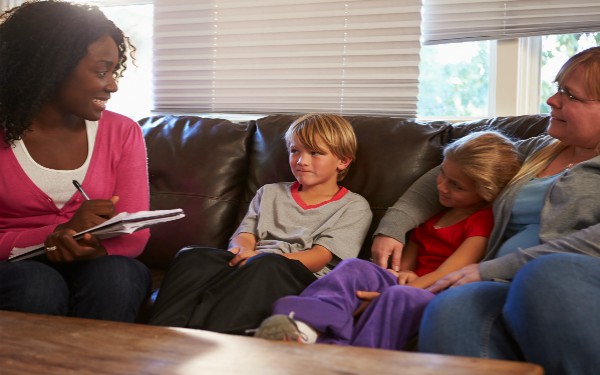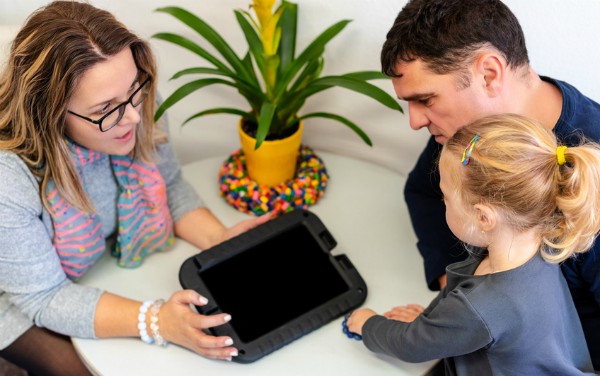“Managers at Wigan are open to what we are saying and that means they are more open to what the children are saying,” says senior social worker Fiona. “When you are able to articulate yourself well and you have a relationship where you can explain what the child needs and are listened to, it makes a big difference.”
For Fiona, that has been her experience since joining Wigan’s locality team more than a year ago. Fiona finds her managers are helpful and open to how she supports the families in her locality. Time and experience are key in developing a relationship with the children and families, Fiona believes.
“Children can be guarded and might want to check with their parents before they open up to us about how they are feeling. You could be recording the child’s words, but they could be coming directly from the parents,” says Fiona. “So, it is about having context and having the time to build those relationships so that you have a sense of what is going on behind what they are saying.”

Like Fiona, this social worker works with the family to capture the voice of the children
Fiona does this by making herself available and believes that even if – in the short term – this increases her workload, it is beneficial longer term in helping her support the children and families in her locality.
“If the parent has an appointment, I will go and look after their child, or take them to school, because doing this gives me insights into the family that I would not necessarily get [on an ordinary visit]. It does require spending a little more time, but I find that these insights help me in the long run.”
Fiona’s manager is aware of her approach and the insights she finds are detailed in her case and supervision notes. She also finds her managers are interested in the children she supports and will try their best to find the help she needs to best support them.
“My managers ask questions about how a child is feeling, and I’ve had situations where a child needs additional support because they have quite complex needs, and our senior managers have really pushed for that to happen. I find that managers are receptive and understand that children do not necessarily fit into a certain box and might need other help.”
Flexible approaches
Fiona came from a local authority that was more prescriptive, but she likes the way that Wigan’s practice model – Signs of Safety – allows social workers to be creative.
“The model ensures that we are not just writing words in a case file but really understanding the day-to-day lived experience of the child,” she says. “Signs of Safety is good because it gives you a framework where you use words and pictures to capture the voice of the child. It’s not just me doing the work but I am getting mum involved too and that is helping to empower the parent.”

Nuala is a locality social worker
Nuala, also a locality social worker, agrees and sees the advantage of using the practice model. She saw the benefits when working with a young child whose stepfather was deemed a risk to the child and was asked to leave the family home.
“This impacted on the child’s emotional wellbeing, and he was confused and asking when his stepfather would be allowed to return,” Nuala says. “We used words and pictures to give him an understanding of why his mum’s partner was not living with him and his mum anymore. Sentences included: ‘Your mum is the person that keeps you safe,’ and ‘your stepdad is not allowed to have time alone with you.’
“We worked together with a school counsellor, and his mum. The child had some questions about feeling insecure and was evidently feeling overwhelmed. Direct work has helped in getting to know him using the three houses and a desert island activity; work in developing his understanding about ‘safe and unsafe touch’, and working with his family network in safety planning.
“The work is directed by him and is based on what is worrying him. His biggest challenge has been understanding why he can’t live with his stepdad when his friends do. My role has been to show him that there are different types of families – all shapes and sizes – and that he can be proud of his own family situation.”
Audits help
In developing practice Nuala also finds that auditing case files has been key in ensuring that the child’s voice remains central. “The child’s voice is integral, and we can’t make a decision without it, so auditing helps to record decision making.
“I address the child when I am writing my case notes and make sure there are lots of positives in there. Statutory visits are recorded and directed to the child. For example: ‘It was lovely to see you. You had your hair in a ponytail.’”
Capturing the voice of the child also means being able to do that when the child is non-verbal or does not want to record their feelings in the traditional way, Nuala says.
“You have to adapt the practice to each child. Every child is different, and every single visit is different. It is important we remember that children who communicate non-verbally always have a voice and that voice comes through their behaviour. It’s our job to observe the child, their home environment, and find their voice and be the advocate for the child,” says Nuala.
Interested in working at Wigan? Find out more by checking out the latest vacancies here.
And visit Wigan’s Employer Profile here.




 Facebook
Facebook X
X LinkedIn
LinkedIn Instagram
Instagram